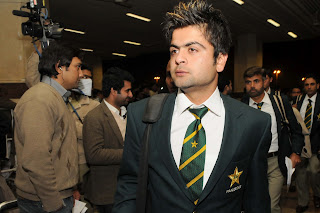Umar Gull Biography
Source Link(google.com)
The least-hyped but most successful and assured Pakistan pace product of the last few years, Umar Gul is the latest in Pakistan's assembly-line of pace-bowling talent. He had played just nine first-class matches when called up for national duty in the wake of Pakistan's poor 2003 World Cup. On the flat tracks of Sharjah, Gul performed admirably, maintaining excellent discipline and getting appreciable outswing with the new ball.
He isn't express but bowls a very quick heavy ball and his exceptional control and ability to extract seam movement marks him out. Further, his height enables him to extract bounce on most surfaces and from his natural back of a length, it is a useful trait. His first big moment in his career came in the Lahore Test against India in 2003-04. Unfazed by a daunting batting line-up, Gul tore through the Indian top order, moving the ball both ways off the seam at a sharp pace. His 5 for 31 in the first innings gave Pakistan the early initiative which they drove home to win the Test.
Unfortunately, that was his last cricket of any kind for over a year as he discovered three stress fractures in his back immediately after the Test. The injury would have ended many an international career, but Gul returned, fitter and sharper than before in late 2005. He returned in a Pakistan shirt against India in the ODI series at home in February 2006 and in Sri Lanka showed further signs of rehabilitation by lasting both Tests but it was really the second half of 2006, where he fully came of age. Leading the attack against England and then the West Indies as Pakistan's main bowlers suffered injuries, Gul stood tall, finishing Pakistan's best bowler.
Since then, as Mohammad Asif and Shoaib Akhtar have floundered, Gul has become Pakistan's spearhead and one of the best fast bowlers in the world. He is smart enough and good enough to succeed in all three formats and 2009 proved it: he put together a patch of wicket-taking in ODIs, on dead pitches in Tests (including a career-best six-wicket haul against Sri Lanka) and established himself as the world's best Twenty20 bowler, coming on after the initial overs and firing in yorkers on demand.
He had hinted at that by being leading wicket-taker in the 2007 World Twenty20; over the next two years he impressed wherever he went, in the IPL for the Kolkatta Knight Riders and in Australia's domestic Twenty20 tournament. Confirmation came on the grandest stage: having poleaxed Australia in a T20I in Dubai with 4-8, he was the best bowler and leading wicket-taker as Pakistan won the second World Twenty20 in England. The highlight was 5-6 against New Zealand, the highest quality exhibition of yorker bowling. He is not a one-format pony, however, and will remain a crucial cog in Pakistan's attack across all formats.




.jpg)


